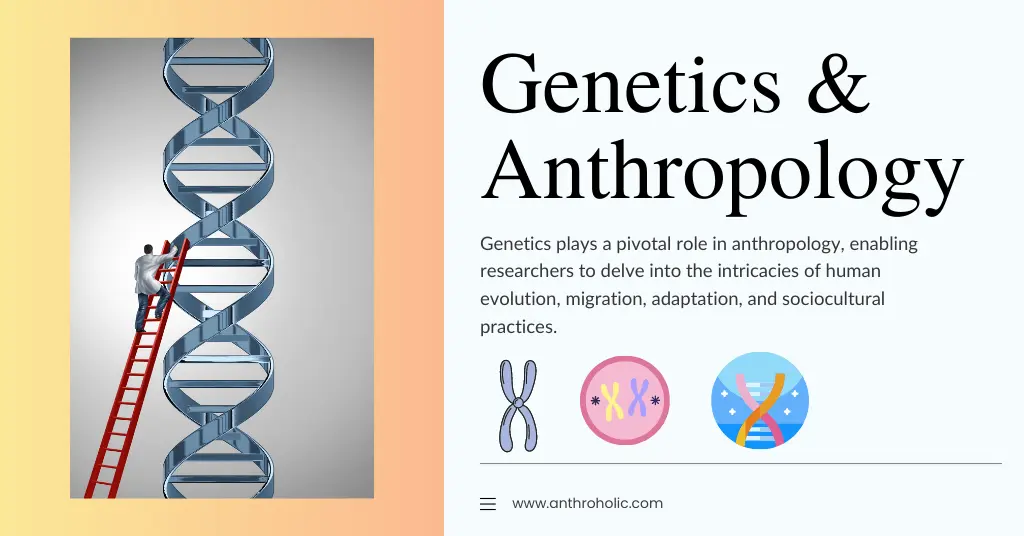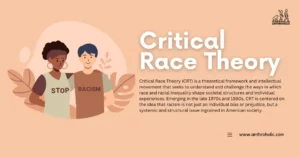AI Answer Evaluation Platform Live Now. Try Free Answer Evaluation Now
Genetics and Anthropology
Genetics is a branch of biology concerned with the study of genes, genetic variation, and heredity in organisms. Its roots can be traced back to Gregor Mendel, a 19th-century monk who first elucidated the fundamental principles governing the transmission of traits from parents to offspring. Today, genetics has grown to encompass a broad range of studies, from the minutiae of molecular biology to the grand scale of species evolution.

Anthropology, on the other hand, is the scientific study of humans, their behavior, and societies in the past and present. A crucial subfield of this discipline is physical (or biological) anthropology, which is primarily concerned with the biological and behavioral aspects of human beings, their related non-human primates and their extinct hominin ancestors.
The convergence of genetics and anthropology has given birth to a new field known as anthropological genetics. This interdisciplinary field uses genetic data to answer anthropological questions about human history, evolution, adaptation, and population movements.
Role of Genetics in Anthropology
Understanding Human Evolution
The advent of genetic studies has revolutionized our understanding of human evolution. The analysis of genetic markers, particularly mitochondrial DNA (mtDNA) and Y-chromosome, has offered profound insights into the matrilineal and patrilineal lineages of modern humans.
Table 1: Significant Genetic Markers in Human Evolution Studies
| Genetic Marker | Inheritance | Usage |
|---|---|---|
| mtDNA | Matrilineal | Used to trace the direct female line of descent |
| Y-Chromosome | Patrilineal | Used to trace the direct male line of descent |
| Autosomes | Both Parents | Used for overall genetic makeup |
Tracing Migration Patterns
The spatial distribution of genetic variations among present-day human populations provides clues about ancient migration and colonization events. For example, the ‘Out of Africa‘ theory, which posits that modern humans evolved in Africa before migrating to other parts of the world, is largely supported by genetic evidence.
Identifying Genetic Adaptations
Population genetic studies allow us to identify genetic adaptations that have occurred in response to environmental pressures. Examples of such adaptations include lactose tolerance in populations with a history of dairy farming and the high-altitude adaptations in Tibetans.
Investigating Genetic Diseases and Health Disparities
Anthropological genetics can also help understand the distribution and cause of genetic diseases and health disparities among different populations. For instance, the high prevalence of sickle cell anemia in certain African and Mediterranean populations is linked to the protective effect of the sickle cell trait against malaria.
Shedding Light on Sociocultural Aspects
Genetics can also offer insights into sociocultural aspects, such as marriage patterns and kinship systems. For example, the study of Y-chromosome and mtDNA can reveal patterns of male and female migration and help infer past societal structures.
Challenges and Ethical Considerations
Despite the potential benefits, the application of genetics in anthropology is not without challenges and ethical considerations.
- Sampling Bias: Due to practical and ethical constraints, some populations may be underrepresented in genetic studies, leading to biased results.
- Privacy and Consent: There are significant concerns regarding the privacy and informed consent of participants, especially in indigenous and isolated communities.
- Misinterpretation and Misuse: The misuse or misinterpretation of genetic information can lead to stigmatization, discrimination, or even pseudoscientific claims about racial superiority.
- Cultural Sensitivity: The collection of genetic data can sometimes conflict with cultural beliefs and practices.
As such, it is crucial for anthropological geneticists to adhere to strict ethical guidelines and maintain cultural sensitivity in their research.
Conclusion
In conclusion, genetics plays a pivotal role in anthropology, enabling researchers to delve into the intricacies of human evolution, migration, adaptation, and sociocultural practices. Despite the challenges and ethical considerations, the judicious application of genetics promises to illuminate our understanding of human history and diversity.
References
- Jobling, M. A., Hollox, E., Hurles, M., Kivisild, T., & Tyler-Smith, C. (2013). Human Evolutionary Genetics. Garland Science.
- Relethford, J. H. (2017). Genetics and the Search for Modern Human Origins. Wiley-Liss.
- Stone, L., & Lurquin, P. F. (2007). Genes, Culture, and Human Evolution: A Synthesis. Blackwell Publishing.



